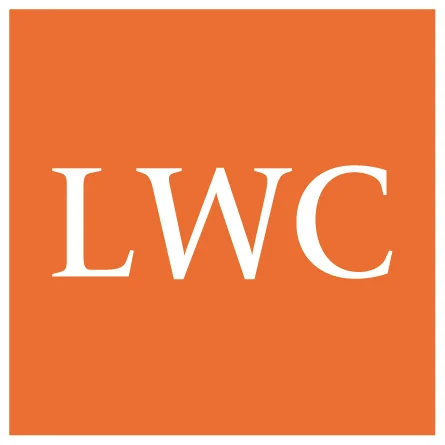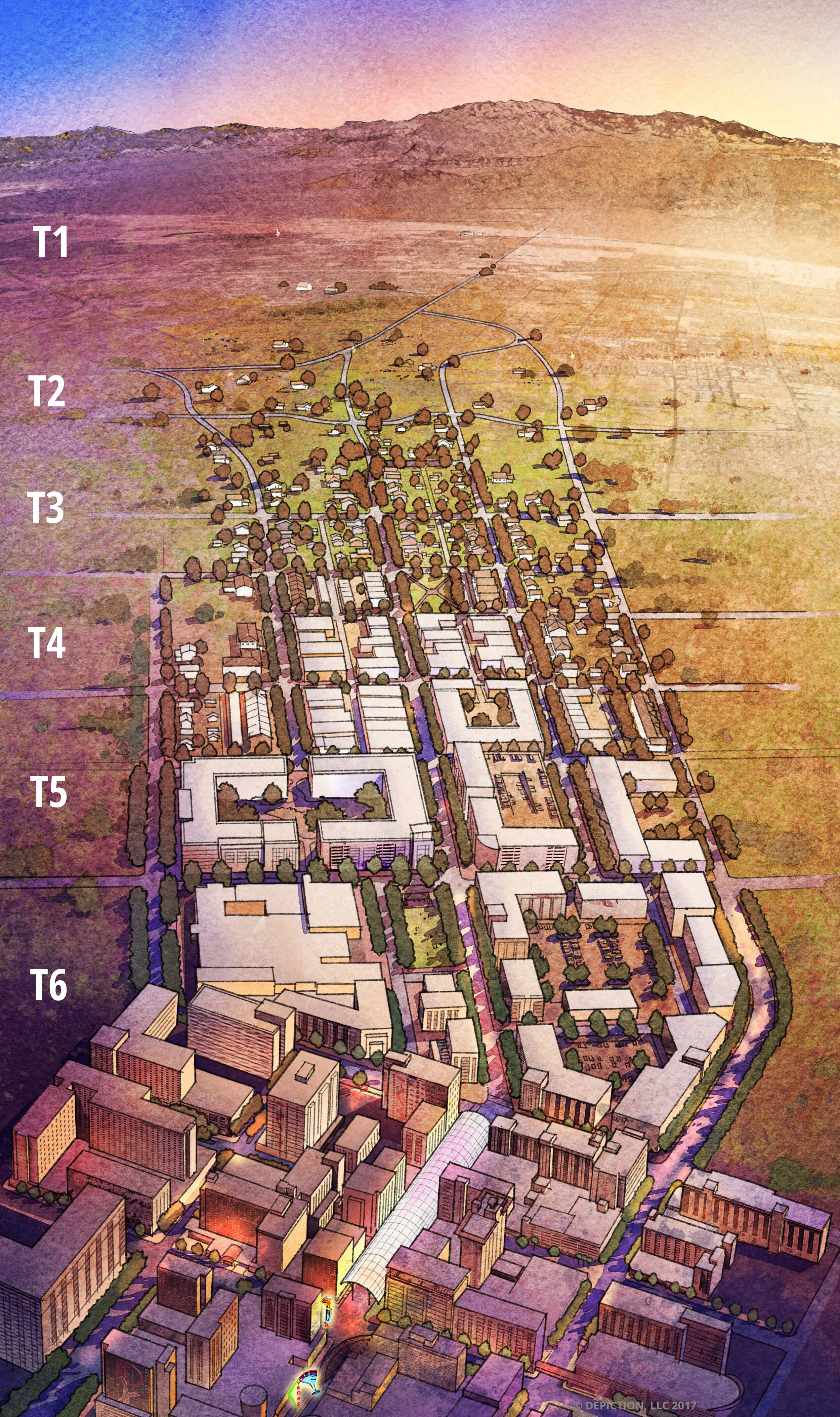Form-based Codes
LWC is a national leader in form-based codes, having successfully implemented form-based projects in over 25 jurisdictions, including Long Beach, CA; Austin, TX; Las Vegas, NV; Cincinnati, OH; Flagstaff, AZ; and Riyadh, Saudi Arabia.
Our President, Lisa Wise, has served as Treasurer and Chair of the Form-Based Codes Institute (FBCI), a non-profit organization dedicated to advancing the knowledge and application of form-based codes. Lisa co-authored an online form-based code lecture series for Planetizen and is a certified instructor for FBCI levels 101, 201, and 301.
A form-base code is a land use regulation that fosters more predictable and more attractive development outcomes by focusing on physical form rather than separation of uses as the organizing principle. A form-based code is a regulation, not a guideline, adopted as part of city, town, or county law.
Image by Zanetta Illustration
Downtown Las VEgas Form-Based Code
Nevada’s First, award-winning Form-based Code
LAs vegas, nv | 2017 — 2023
In 2017, the City of Las Vegas hired LWC to complete a Form-Based Code to implement Vision 2045 Downtown Las Vegas Master Plan. LWC was tasked with creating a structure for the Downtown FBC and writing the standards for four districts: Medical District, Fremont East, 18B Arts, and Historic Westside. The Las Vegas Medical District FBC was adopted in October 2018, making it the first Form-Based Code in the State of Nevada.
Working closely with City staff, LWC completed a detailed analysis of development patterns and developed an efficient and user-friendly way of incorporating the Form-Based Code into the City’s Unified Development Code.
As part of the project, LWC facilitated five form-based code workshops to educate city staff, developers, interested citizens, and elected/appointed officials. In 2019, the FBC was recognized by the Nevada Chapter of the American Planning Association with an Outstanding Implementation Plan award.
South Hayward BART/Mission Boulevard Corridor Form Based Code
Streamlining and modernizing Two Codes for Transit-Oriented Development
Hayward, CA | 2018 — 2020
LWC was hired by the City of Hayward to lead the update of the South Hayward BART/Mission Boulevard and Mission Boulevard Corridor Form-Based Codes. LWC initiated the project with a thorough code-review and audit to identify internal inconsistencies and developed a recommended approach to streamline, modernize and unify the codes, making them easier to use, understand, and administer. The overarching goal of the project was to implement the Hayward 2040 General Plan and the City’s Economic Development Strategy Plan through clear and consistent rules and regulations.
LWC worked closely with the community and City Staff to update the regulations aimed at transforming the Mission Boulevard corridor into a vibrant, pedestrian- and transit-oriented mixed-use place and ensure high-quality public spaces and encourage a mix of building types and uses. The revised Code combines the two Codes into one unifying document to regulate the boulevard and relies on clear and simplified frontage type, building form, large site, and land use standards, as well as new procedures to streamline the approval process.
Comprehensive Development Code Update and Form-based Code
Form-Based Standards for the Heart of the Inland Empire
Rancho Cucamonga, CA | 2019 — 2022
The City of Rancho Cucamonga hired LWC to conduct a comprehensive update of its Development Code (Title 17) aimed at a more effective implementation of the vision established in the General Plan: to be “the cultural and economic hub of the Inland Empire.” The City has experienced rapid population and economic growth and is in a strategic position given the billions of dollars currently invested in San Bernardino County in technology, transportation, healthcare, and new entertainment venues.
The previous Development Code was amended numerous times as the City grew and the economy diversified, and its zoning district-based approach was no longer sufficient to produce a flexible, responsive regulatory tool to achieve a vibrant, walkable, human-centric urban fabric.
Building from extensive community engagement, LWC worked closely with City staff to identify inconsistencies among the existing Code, General Plan, and State law, providing clear direction on the City’s development expectations. LWC also analyzed eight existing Specific and Master Plans and integrated regulations into the Citywide Development Code. The update also included new multi-family and residential mixed-use Objective Design Standards that align with new State requirements. Ultimately, the code update strengthens the relationship between policy and regulation, giving the City a more streamlined, user-friendly development process.
The new Code applies form-based elements to preserve the existing character and quality of established neighborhoods while enabling attractive, affordable housing choices and pedestrian-oriented infill development “by-right.” Ultimately, the new code assures more predictable, streamlined, context-sensitive results, harmonious transitions between public and private realms, and more balanced shifts between buildings, sidewalk, and the streetscape.
The updated Code was adopted unanimously by the City Council on May 18, 2022, after a unanimous vote by the Planning Commission in favor of the new Code.
LWC Projects with Form-Based Code Components 2006 — Present
Alameda County, CA, Ashland and Cherryland Business District Specific Plan and Code Update
Austin, TX, Land Development Code Update
Benicia, CA, Downtown Mixed-Use Master Plan and Form-Based Development Code
Benicia, CA, Lower Arsenal Mixed-Use Specific Plan and Form-Based Code
Cincinnati, OH, Zoning Code, Comprehensive Plan, and Economic Element
Flagstaff, AZ, Zoning Code Update
Grover Beach, CA, West Grand Ave. Master Plan and Form Based Code
Hayward, CA, Form-Based Code Update
Iowa City, IA, Form-Based Code Update
King, CA, Historic Corridor Revitalization Plan and Form-Based Code
Kingsburg, CA, Development Code Update, Form-Based Code, and Economic Study
Las Vegas, NV, Form-Based Code Overlay
Livermore, CA, Development Code Update, Including Form-Based Code
Mesa, AZ, Form-Based Zoning Code and Regulating Plan
Moraga, CA, Moraga Downtown Specific Plan Implementation
Pasadena, CA, Form-Based Street Guidelines
Petaluma, CA, SMART Rail Station Areas: TOD Master Plan
Richmond, CA, Richmond Bay Specific Plan
Richmond, CA, Liveable Corridors Plan and Code
Soledad, CA, Downtown Vision Program, Specific Plan and Code
Tehachapi, CA, Zoning Ordinance Update
Vallejo, CA, Zoning Ordinance Update
Westerville, OH, Hybrid Code



